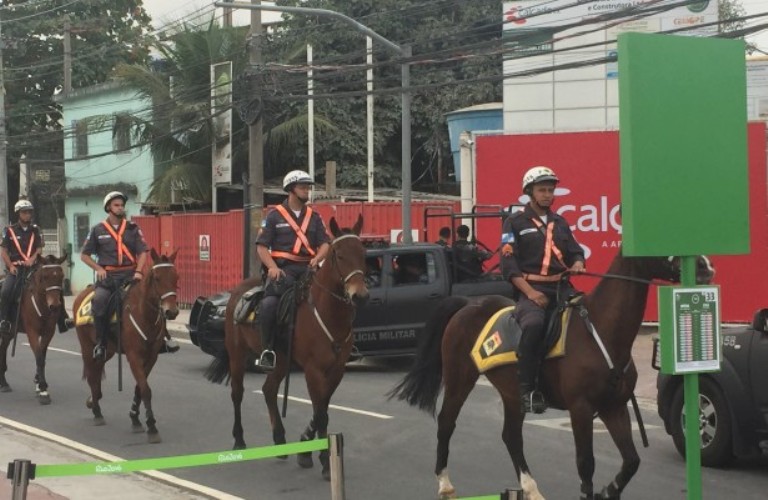
Olympics: The Two Faces of Rio Games 2016
The streets of Rio are suddenly visibly more patrolled as the 2016 Olympics burst into life, writes GARY LEMKE. Heavily armed military are on foot and in vehicles. Helicopter blades cut through the air as they hover in the sky, noticeably above Olympic Park where the athletes’ village is, and which houses a number of Games venues. […]

The streets of Rio are suddenly visibly more patrolled as the 2016 Olympics burst into life, writes GARY LEMKE.

Heavily armed military are on foot and in vehicles. Helicopter blades cut through the air as they hover in the sky, noticeably above Olympic Park where the athletes’ village is, and which houses a number of Games venues.
The Olympics have been hit by terrorism before, notably in the 1972 Munich massacre and the lone wolf pipe bomber in Atlanta in 1996. This time though, things feel different.
Fox News television reports are telling their audience that an attack ‘is likely’ during these Games. Some 12 would-be terrorists were recently arrested, and labelled ‘amateurs’ and the public urged to be vigilant, but that there was no need for panic.
There isn’t panic in the air, just a strange juxtaposition that as the greatest celebration in sport is about to commence, it comes at a time when the world is walking on eggshells, and some 85 000 security personnel have been assigned to ensure these are a ‘safe’ Games.
You can see the the anxiety in the eyes of the military and police when you walk past them on the way to a village or a venue. They have their automatic weapons pointed to the ground, but with a finger on the trigger. They also pack two pistols, bulletproof vests and are ‘miked up’. They are prepared for the worst.
There is a modern reality to these Games, unlike I’ve encountered since covering my first Olympics or Commonwealth Games in 1992. That reality is the threat of terrorism and the world is at war with it.
Tens of thousands of ‘ordinary’ people, from volunteers to athletes to media, are walking the streets wearing backpacks. I have found myself consciously aware of that, and am deeply respectful of the jobs the military are doing to ensure safety. Backpacks have been associated with suicide bombers, there is no escaping that fact.
The language barrier is a considerable one; very few people, military included, understand English. You certainly don’t want to be wearing a backpack and walk hurriedly up to security personnel in the streets and start asking for directions; that can only add to the reality that exists: Rio is on high alert for lone wolf terrorist attacks.
Military vehicles with mounted guns on the back are a common sight as they drive on the public roads. They are on alert and prepared. They’re not sitting on the back of these vehicles sharing a laugh and waving at passers-by. There’s a steely focus.
And when football opened the sporting proceedings at these Games on Wednesday, a helicopter circled the Olympic stadium while outside military police patrolled in armoured cars and on horseback.
Rio is paying a high price for hosting the 2016 Olympics. There have been heavy criticisms about rooms in the athletes’ village not being ready, leaking toilets and pipes, beds that are too small, filthy waterways and there has been the over-played threat about the Zika virus. Some of the complaints have been petty, some justified.
Now, most importantly though, the fight to keep everyone safe. The cost must run into billions and the question must be, how much will it actually cost Rio to stage the Games? I fear the city is going to be feeling it in the years to come.
I also get the feeling that this is the last time we’ll see the Games in South America for a long time and I don’t see it being staged in Africa for the first time anywhere soon. 2020 will take the show to Tokyo and 2024 will be either Los Angeles, Rome, Paris or Budapest. Given the current threat of terrorism in Europe, I can’t see the vote going there, which makes LA my favourite for 2024. Four years after that Europe might be given a look-in again.
Rio is a spectacular city but I fear it has bitten off more than it can chew – of no fault of its own. It’s the way of the world as we are living in it in 2016.
Source:Sascoc.co.za
